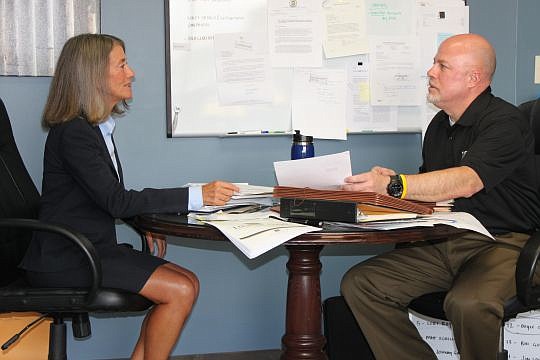
The down-on-its-luck family facing the harsh reality of foreclosure. The single, working parent barely making ends meet. The working poor in general.
Jacksonville Area Legal Aid’s goal is to help low-income residents through their civil legal issues. That mission has been with the nonprofit officially since 1973. Needed funding hasn’t.
A key source from The Florida Bar Foundation has been drying up in recent years. During the same period, Gov. Rick Scott has rejected $7 million in funding for such services over his tenure. And the city’s share has mostly trailed off the past several years.
Yet, at the local level there is new a push for support.
A bill being drafted would provide a funding boost to the nonprofit with taxpayer dollars, but it’s not a strict “give.” Instead, it’s a public-private partnership, one that has both City Council members and Mayor Alvin Brown on the same page — something that hasn’t always been the case on funding issues.
It could provide an extra $1 million annually toward helping the legal needs of the poorest, at a time when the organization itself needs financial assistance.
Falling funding
One mainstay of legal aid funding across the state has been The Florida Bar Foundation, which manages the Interest on Trust Accounts program, often called IOTA. With the recession of the past few years, though, that money has dwindled.
In fiscal 2010, the foundation provided $2.3 million — $1.2 in general funding and $1.1 through grants — to JALA. In its budget that year, expenses were $6.7 million with revenue of $6.5 million. The difference came from reserves.
The foundation’s funding has dropped ever since, all the way to almost $597,000 for fiscal 2014. Of that, more than $396,000 comes from general funding, $200,000-plus from grants.
JALA’s overall budget has dipped to $5 million.
That means fewer attorneys to handle fewer cases and needs that only have risen.
Outside of the foundation funding, Scott hasn’t been in support of funding through Florida’s Access to Civil Legal Assistance Act. It’s designed to provide emergency legal services to low-income families, with funding going to organizations like JALA.
Scott vetoed $2 million in his latest budget, just as he did the past two years and another $1 million his first year in office.
Jim Kowalski, JALA’s executive director, wasn’t happy with the decision. He wrote a letter to Scott late last month, critical of the veto.
“I am confident that you do not understand the daily struggles of Florida’s working poor and do not understand, from a basic level, the role that legal services plays statewide in supporting our current economic system — a system supported, in large part, by the working poor,” he wrote.
Kowalski said Friday that by not supporting such services, main funding comes from the federal government — which often has its own marching orders and means policies are outsourced to Washington, D.C.
It’s better, he says, to keep it local — those who know what’s needed are already here and can best set policy and meet needs.
The state level also has seen a push by a group trying to increase Florida Bar membership dues annually by $100, but it’s had pushback. The Bar’s Board of Governors unanimously voted in March to oppose a petition seeking the increase. But, the petition has been filed.
Former Florida Bar President Eugene Pettis called it more of a societal problem that needs to be handled by the community and not just attorneys, according to a News Service of Florida report from May.
Locally, the city contributes funding through Public Service Grants and a four-way split on a collected $65 court surcharge.
Like sources elsewhere, those also have dropped.
In 2010, JALA received $194,000 through public service grants and $313,000 through the surcharge — totaling $507,000. Last year, it received nothing through public service grants and $250,000 through the surcharge.
The societal problem locally hasn’t been helped as much over the past few years. Some assistance could be on the way.
The partnership
In his budget presentation to council members, Brown alluded to public-private partnership that could result in an increase for JALA. The organization, he said, “has become a major partner in helping our citizens achieve economic stability, especially in areas like housing.”
He credited council member Bill Gulliford for the idea.
The idea, as its currently drafted: the city will annually match up to $1 million of money JALA raises privately and receives through the $65 surcharge.
JALA will report how much it raises no later than June 1 so it can be included in each budget. There is no sunset on the bill and JALA could still receive funding through public service grants.
“This would provide an incentive that empowers JALA to be innovative in its fundraising,” Brown told council members.
The figure for fiscal 2015 is $443,000.
Chris Hand, Brown’s chief of staff, said the goal is for the legislation authorizing the partnership to be filed by the Aug. 6 filing deadline and before council committees meet Sept. 2-3.
Kowalski worked with council members last year, but was new to the position and the political process.
While the bill hasn’t been introduced, Kowalski said about a dozen council members have shown support for the measure.
Gulliford, he said, suggested the match program.
“I understand the need,” Gulliford said Friday. “So many people out there don’t have access … the unfairness is, people that have money and access it’s obviously not a problem. A lot of people don’t have that.”
As Kowalski says, the money JALA raises would come from non-taxpayer sources.
Armed with such a framework, he said he and others would return to the legal and business communities to seek additional support from the private sector.
The match, in effect, is society stepping up to help the problem.
@writerchapman
(904) 356-2466